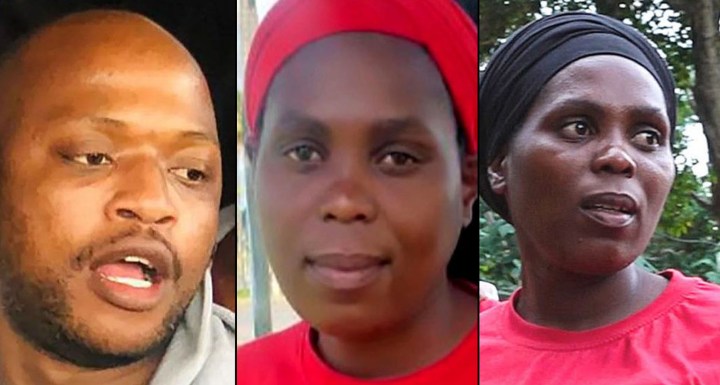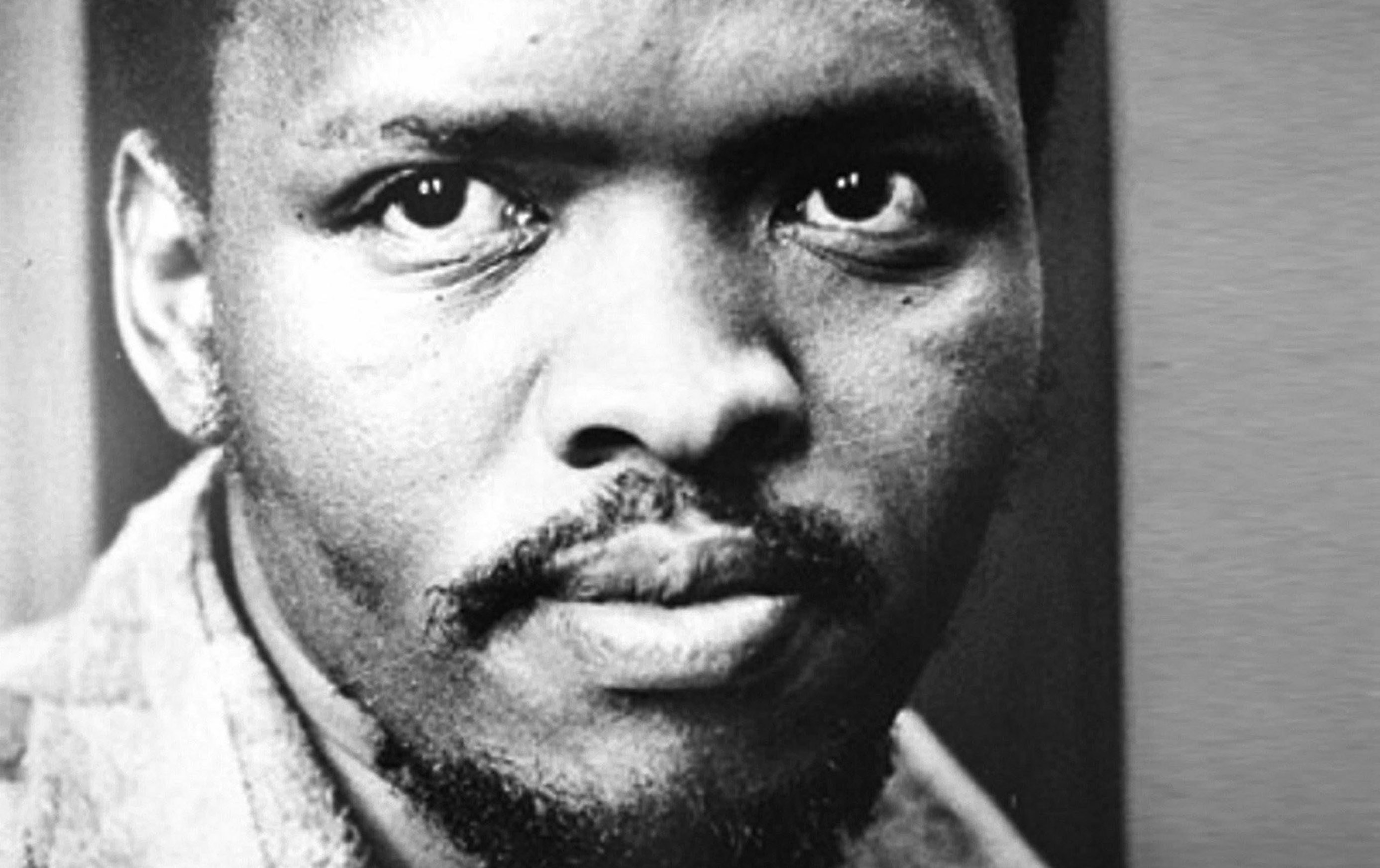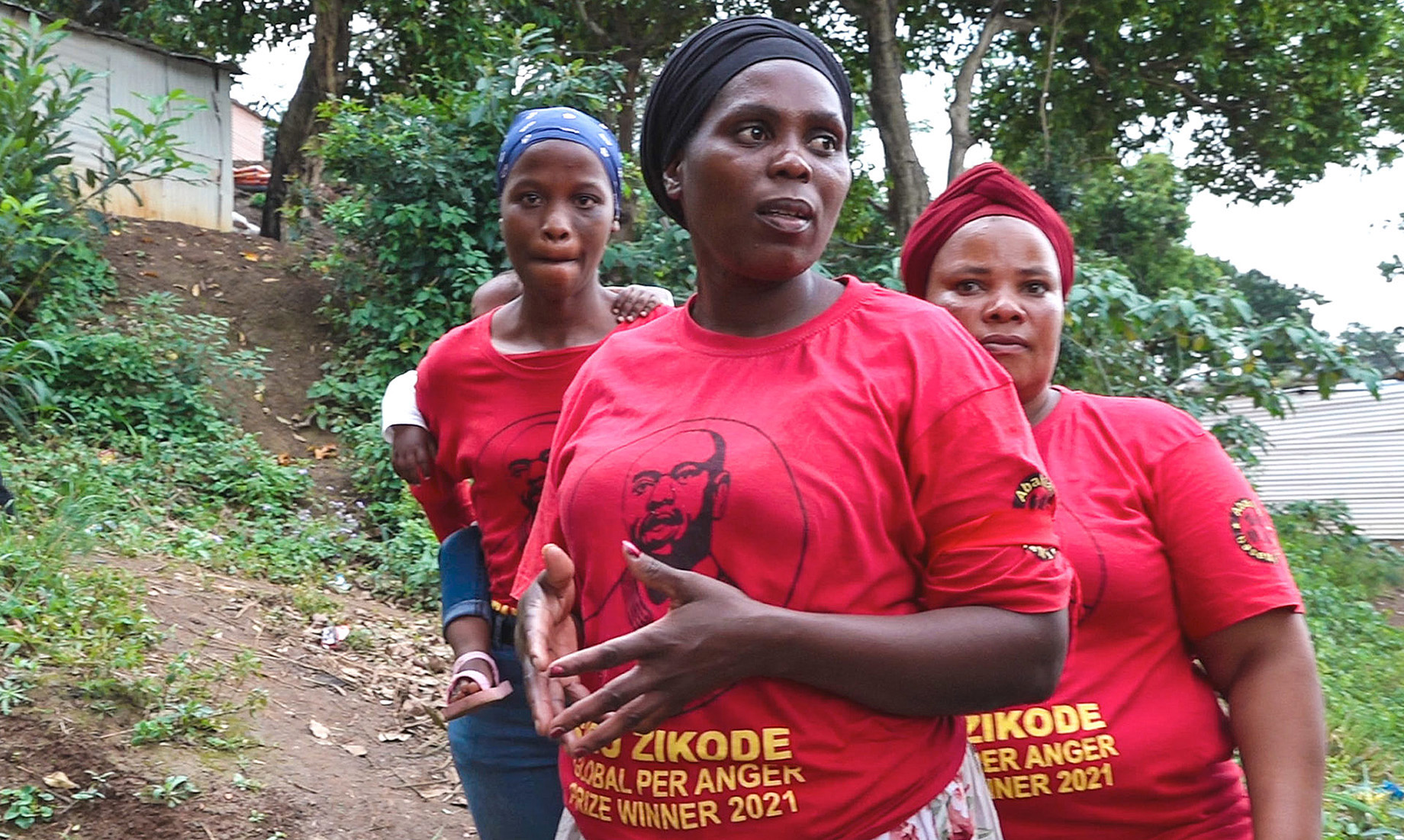AGE OF ASSASSINATIONS OP-ED
Abahlali baseMjondolo — Clinging to life in the shadow of death

People in eThekwini are remarkably kind and friendly. Unless they want to kill you. This is a piece about assassins, death, hope and fear, distrust and love. It is also about people who live and die by their commitment to Umhlaba (land), Izindlu (housing) and Isithunzi (dignity).
When I read in Daily Maverick on 12 May about the assassination of Nokuthula (Thuli) Mabaso, a member of Abahlali baseMjondolo, I felt compelled to get to Durban as soon as I could to be with her children and the Abahlali community.
During my trip to eThekwini, everyone — including my Uber driver, other drivers, the Palace Garden hotel staff, airport and restaurant employees — was friendly, concerned about my safety and at pains to ensure that I got the best service wherever I went. It was touching.
Here, in Jozi, we’re friendly — up to a point, but we generally pay scant attention to others as we get on with our busy lives.
The people of the Abahlali baseMjondolo shack dwellers commune are not who you might think they are. The people of eKhanana, eNkanini and other settlements across our land, are proud, productive and profoundly progressive members of vibrant and creative, if deeply impoverished, communities.
Abahlali has between 80,000 and 100,000 members across five provinces. It also has strong links to international shack dweller communities in India, Mexico, Brazil and elsewhere in the world. They have the support of internationally respected public intellectuals and labour activists like Noam Chomsky, Ruth Wilson Gilmore and Martha Bragin of Global Social Work and Practice with Immigrants and Refugees at Hunter College.

At the Abahlali offices in Diakonia Centre, Durban. From left to right: Shawn Hattingh (ILRIG, Johannesburg), Mthetwa Xhali (ILRIG Cape Town), three men at back from the Syrian Kurdish group. Front row, Alice Caleni, Zoleka Jali, Thapelo mohapi, Mfanufikile SZindane, Thabile Makhoba. (Photo: Supplied)
During my time with the Abahlali leadership in their offices in the Diakonia Centre in central Durban last week, I was privileged to attend a meeting with a delegation of young Syrian Kurds, who had come to express their solidarity and support.
At the meeting, Abahlali president S’bu Zikode outlined how he and others founded AbM in 2005, “out of hunger, anger and frustration” that arose when land promised to shack dwellers in Kennedy Road in eThekwini was sold to others to make money: “They put the commercial value of the land ahead of social needs.”
Zikode described how the commune subscribed to the values of respect, dignity, democracy and equality. He added that they had been told they are one of the biggest social movements in the country.
“If the international community had not been watching, we would have been destroyed,” he said.
Zikode went on to detail how 23 Abahlali activists have been slain, describing the unimaginably painful task of “having to tell families they have lost a son or a daughter, a mother, a father”.
The killers are in government, Zikode maintains.
“The responsible people are in the city council. They hire hitmen or our people are killed by law enforcement, Land Invasion Units or Red Ants.”
He described how the community is now in crisis: they live in the shadow of death, and were especially traumatised after two of their leading activists were killed in the past two months.
“We loved our comrades. All we have is us, together,” he said.
He speaks of how shack dwellers have felt lonely, isolated and unseen.
Zikode, a former garage attendant who has survived two assassination attempts and been forced into hiding several times, now only moves in the company of heavily armed guards. He went on to describe how many of the killings have been brazenly carried out in broad daylight and that there has only been justice for the murders on two occasions.
One of these was when two ANC councillors and their hitman were found guilty of assassinating national council member Thuli Ndlovu, on 29 September 2014.
Why Ramaphosa (apparently) kept mum about multimillion-dollar robbery at his farm
‘Every disaster hits the poor the hardest’
Zikode has also spoken about how the recent floods in KwaZulu-Natal have affected the poorest of the poor.
“Every disaster in Durban — from the hard lockdown to the riots, fires and floods — hits the poor the hardest. Natural disasters become entwined with political disasters, often resulting in devastation for the poor.
“Since 2005, we have been saying that the conditions under which we are forced to live in a repressive society are dangerous as well as undignified: the floods in KwaZulu-Natal have devastated many shack settlements and some rural areas too.
“Some people were rescued as the rivers burst their banks, but many lives have been lost.”
Another attendee, Alice Caleni, chairperson of Abahlali KZN, described how the movement was facing many challenges. Despite that, she said, there would be no turning back.
Members felt encouraged by the support they’d received recently. The commune has been visited by delegations from Finland, Sweden and other countries and organisations.
Caleni paid tribute to their assassinated comrades who’d laid down their lives for their struggle, and who have become their ancestors.
“This government is not our government. We don’t have homes… we don’t know where we belong with this government. They say they are building houses for people, but who are these people?”
Mfanufikile Sindane, a 28-year-old representative of the Ekukhanyeni branch, Pinetown, who had sat quietly listening, spoke up:
“The build-up to these killings came in 2018 when we were infiltrated by the ANC. The ANC tried to do that because our movement is built on respect, human kindness and dignity.
“This is a bottom-up system; our mandate comes from the ground, from the masses. Everything is referred to them. This has helped us to avoid mistakes. National government must make us part of decision-making.
“We have set up political schools which are dominated by young people. If we don’t do that, we will be setting a ticking time bomb, or worse. So many children are born in shacks. They have never lived in a decent house.
“We have decided to train and give our own teaching at schools. We are building conscientised young people. These schools are built by the community.
“We have been attacked because we conscientise young people to create their own ways of living, because government is not on our side. When we occupy land, the government doesn’t think. It builds schools that are not nearby. They have underdeveloped our settlement because they are saving it for commercial use.
“Without land we have nothing. The government is turning to the Fourth Industrial Revolution. Young people in settlements don’t have those gadgets. We [Abahlali] are prioritising young people because they are the future of the country.”
Shawn Hattingh and Mthetho Xhali from the International Labour Research and Information Group spoke of the political school they are involved in in Cape Town, and of how they would like to set up exchanges between their schools.

Steve Biko. (Photo: biopgraphy.com/Wikipedia)
The teaching is heavily influenced by the work of Frantz Fanon and Steve Biko, so that people can learn about each other’s struggles.
Hattingh noted that as an international organisation, Abahali wanted contact and connections with people from Syria, Palestine, Ireland and other places where similar struggles were being waged.
Abahlali secretary-general Thapelo Mohapi described how Ekhanana residents had, until recently, a community kitchen where people cooked together. The food came from their communal garden, from the chickens they raise. People ate together in the communal hall they’d built. Everyone participated in the food garden, with the first shift going to work at 3am and others working different shifts during the day.
Nokuthula’s sacrifice
Nokuthula, a much loved and deeply respected leader in the community, was shot four times in the back and twice more in her chest. The hitman then took her cell phone.

Abahlali base Mjindolo leader Nokuthula Mabaso (standing in the middle) was shot dead on 5 May 2022. (Photo: Nomfundo Xolo)
She died in front of her children — a five-year-old and a disabled 17-year-old — in the arms of women who had come to her assistance. She was 40 years old.
Much has been written about Nokuthula. She was the inspiration and the force behind the commune’s food garden and ensured that around 100 children did not go to bed hungry at night. That’s no mean feat in this gravely impoverished settlement, which has been hugely affected by the devastating floods earlier this year.
Mohapi was briefing me as he took me to the place where Nokuthula had been killed. I was even more sickened when he pointed out the police station not five minutes down the road, from where police almost certainly heard the shots but failed to investigate.
“Instead”, he said, “they had to be fetched and brought to the murder scene.”
Nokothula “Thuli” Mabaso was due to testify against the alleged killers of Abahlali deputy chairperson, Ayanda Ngila. Four men have been charged with murdering him on 8 March this year, in the same informal settlement where Nokothula was shot.
She died because she witnessed his murder and had signed sworn affidavits about what she had seen.
During the three hours I spent with the community leaders who had come together for my visit, they spoke and cried and laughed and seemed to get in touch with their creativity.
Zikode observed during our meeting that they don’t speak to each other enough and don’t share their feelings, at a time when many of them feel vulnerable and close to breakdown.
Towards the end of our time together these astonishing people had begun to forget about me and simply talk among each other, which was heartening to see.
The next day I spoke to five of them, all of whom had slept properly for the first time in two weeks.
One of them, Fikile, subsequently sent me a WhatsApp: “Talking to you made a big change. I felt something move from inside my soul.”
Since my return, I have stayed in touch with some of the leaders, all of whom are beyond busy trying to keep themselves and their community afloat and to get themselves back on track.
I have listened to the leadership and am trying to respond to their needs and requests, the main one of which was for psychotherapy.
Apart from their experiences and views which I’ve described here, this is what I discovered they need:
- Psychotherapy and psychiatric care for individuals.
- Psychosocial support for individuals, families and groups.
- Teachers for the Fanon school.
- Funds for the school for stationery, books, toys and games for children.
- Food to feed the whole community.
- Funds for shelter, security, lawyers, the food garden and for goods and services which were damaged or lost during the floods.
- Medicines and medical supplies.
- A show of support from anyone who is interested and cares about the struggle for land, houses, dignity, justice and human rights.
So far, Vanishaa Gordhan, operations manager at the South African Depression and Anxiety Support Group has generously offered to ensure that Abahlali leaders get immediate psychological support in the short term, and that there is a counsellor who will check in every two or so days with each of them.
Vanishaa and I will be finding therapists who can offer long-term psychotherapy and support to the leadership and to others in the community who are identified as being at serious risk.
One psychiatrist has so far offered free sessions and help to get affordable medication.
Monetary donations to the community:
Here are Abahlali’s banking details:
First National Bank, Queen St, Durban. Account number 6278623823. IBAN/SWIFT code FIRNZAJJ.
And yes, psychosocial support is the long-term answer. For now, it’s critical that we organise support for the leadership.
We are all connected, we are all responsible and we should all be clear that we are the only ones who can and must make change happen. DM/MC
Lauren Gower is a clinical psychologist and psychoanalytic psychotherapist who worked as a reporter and sub-editor on the Sunday Express and Rand Daily Mail newspapers and as an editor for Ravan Press. She is a writer, editor and proofreader as well as a human rights activist and mental health advocate.




















 Become an Insider
Become an Insider
Comments - Please login in order to comment.